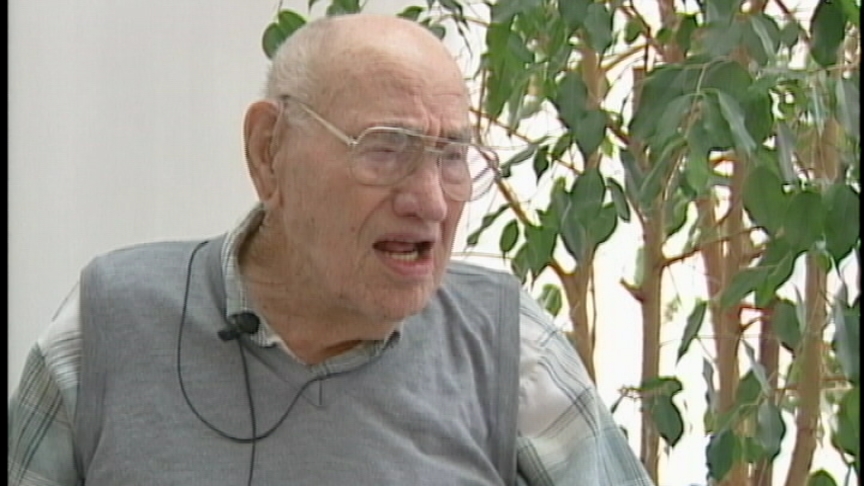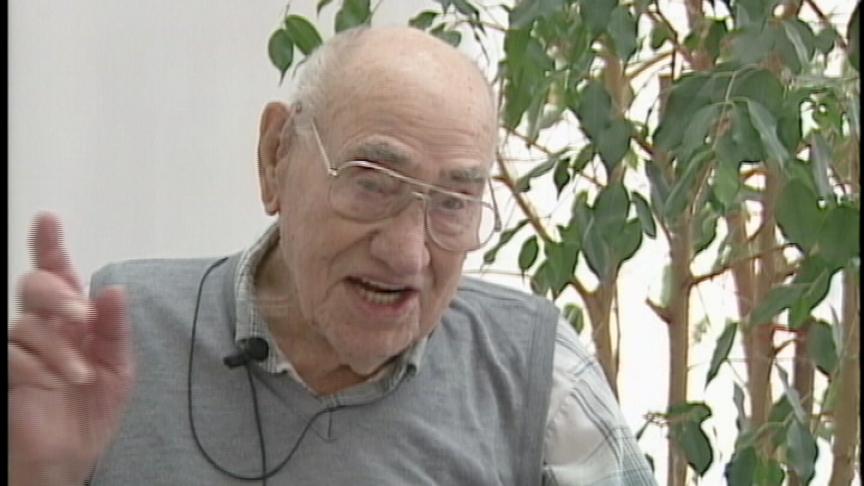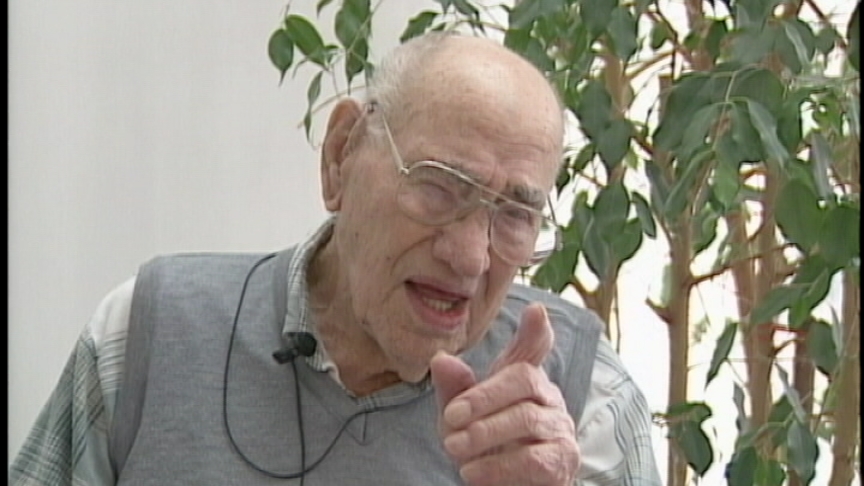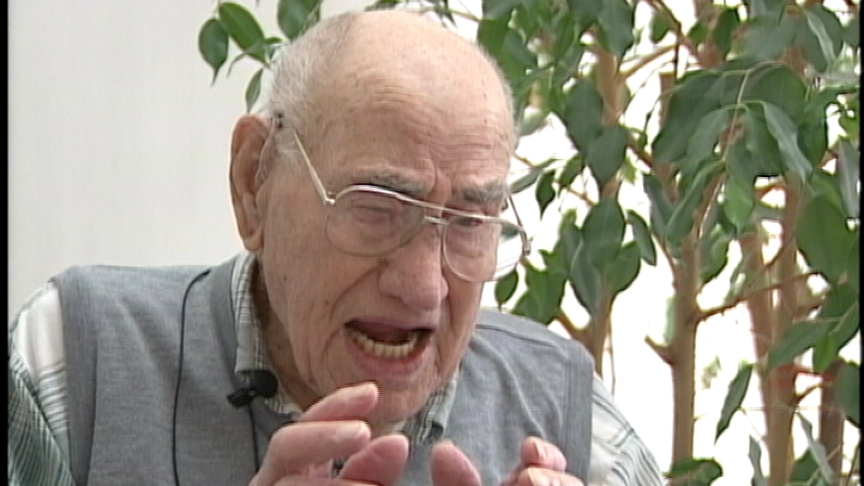There, there was a town there that we took and then we got on
this side of the canal, there was a canal going through,
and we stopped there and the Germans were on the other side,
and they blew up the bridge. Cambridge, I got it, Cambridge.
They blew up the bridge. So I was in the house,
we were with a bunch of boys down in the cellar, you know.
They were staying there all night and the orderly officer came
along and he said, he said -- always had a password, you know,
always did, everyday. He said, "The password tonight," he said,
"will be Cambridge." That's what it was Cambridge and he said it
was Cambridge tomorrow morning. And he said to me, "Alf," he
said, "I want you to take your men and go across on the bridge."
You had, the bridge had blown down but there's stringers.
"Go across and, and spread them out and, and for a covering
party for the rest of the battalion." Why? I thought of it
afterwards. I said, "Oh, oh okay sir." Why didn't he be the
first to go, not me? He's the officer in charge. I went across
there expecting to be picked off. I expected that because
they were on the other side, and, and I'm crossing the bridge
with all of my men on, on these stringers and we were on hands
and knees and carrying a rifle. And we got across and there
wasn't a goddamn shot fired. Not a shot! I got, I got them all
lined up. All along everywhere and finally the battalion
(inaudible). They built, the engineers come in and,
and built a bridge across, on the water, you know, one of those
bridges they have and across. So we went up through the town,
quite a big town. I seen one German, one German and he was
running and hiding. Finally he wanted be taken prisoner and some
of the boys were shooting at him, you know. But he was harmless,
other than to say he wasn't, he wanted to be taken prisoner
anyway. I went on the other side looking for stuff, the other
side of the coal mine. I went, we went along different places
hunting for them and then couldn't find them. They'd go on
way back. I come across a wagon full of ammunition and two
horses, four horses dead, laying there dead. One of our shells
hit it, and, and a, and a German foot cut off there. It was
laying down at the side of the wagon and it got him way.
I overhauled a wagon and I hauled out some clothes was into
a hole in that there. And opened it and there was a bottle
of German schnapps, German whiskey in there.
I never touched it. I, I, I took it but I'd never, never take a
drink out of it. I never would. Some would try it. So we had
brought, we had some prisoners and one fellow was wounded pretty
bad so I took the top off and I said, oh, he said, "Good, good."
He took a drink and I said, "That's good, that's okay."
So I put it in my pocket and that's all he got out of it.
I'll never, never try that because they'd try all kinds
of traps for you, you see.
Interviewer: You should have shared that bottle of schnapps
with the officer that sent you across.
The officer, no, no. So we were up we're on the other side.
We were on the, we were on the run then we were, we were
going (inaudible). Everyday we were in a new town mostly.
Interviewer: So the advance was a couple of miles a day?
Yeah, oh yeah.
Interviewer: Was the artillery able to keep up?
Oh yes artillery, artillery was pretty good you know. They were
mobile, they're pretty good. Some, some small ones were pulled by
horses and some more went by tractor, stuff like that.
Interviewer: But after the stalemate for those many years
in the trenches this must have been almost unheard of
to be moving that fast?
Yeah. Yeah, that's right. They were in for a long time, holding
the line, we called that was. It was just staying there. Yeah.
Interviewer: So did you feel then that the war was nearly over?
Yes. I knew it was over. I knew it was over, sure. And we just
kept on coming for Mons so and we took Mons the day,
the day she ended.
Interviewer: And when did you find out that the war had ended?
We found out right away. The officer told us right away.
He told us, he said that she's all over.
Interviewer: And what was the reaction?
Oh god. I nearly fired my rifle away. Yeah it was,
it was quite a, quite a, a thing, yeah. We went up as far as
Belgium. When the war, we were at Belgium when the war
ended, the capital of Belgium just outside. We started,
I'll tell you why. They wanted to take the 3rd and 4th Division,
I was in the 3rd and let the 1st and 2nd go home first.
So to take us up. So that's when we arrived up that far
and then big speech come on, the big General come out
and he said going through the trouble of getting us up that
we'll send you home first and let the 2nd and, the 1st and 2nd
Division stay where they are in Germany, and they were mad
about that because, because they were over first. That ain't
saying, that ain't saying they should have stayed home, but we
went home first. I, I come home in the 20th, 20th of February
19...., 1919 yeah, yeah 1919.
Interviewer: Did you land in Halifax?
I land in Halifax. The 20th, I landed in Halifax. I'll tell you
I could have come back, I could have landed in Montreal.
I didn't come back with the battalion. No, quite a few of us
belonged to Nova Scotia in the Battalion and we paraded before
the Colonel to see if we could stay and come back with an outfit
that's coming to Halifax. So, they wasn't going to stop off.
They were going to Montreal, so we'd have to go up to Montreal
and parade up there and then come back and parade again and
so we didn't want that. So they, they were, they were a week
ahead of us, the battalion was. I know my father was saying,
"The battalion's back where, where's Alf? He's not home yet."
Well however, and we come back the 20th, on the 20th we were
in Halifax. I, I arrived in Halifax, I forget what time of day
it was, it was about noon time or around that time. I knew at
3 o'clock in the afternoon I was a free man, I had my discharge.
Interviewer: So within a few hours you were discharged?
I had my, yeah in another few hours. I had my discharge, but
still a soldier for another week. They, they paid you for the
week, they paid you for another week. They give you the chance
to get a uniform you see, a chance to get civilian clothes.
Interviewer: What, do you remember what they paid you for a week?
Yeah. A dollar ten a day. I got a dollar fifty being a Sergeant,
that's all. Dollar ten a day that what you got for,
you figure that out for a week.
Interviewer: So you didn't get wealthy during the war?
You're darn right you don't get wealthy, I'll tell you that.






